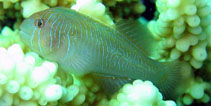| Family: |
Gobiidae (Gobies), subfamily: Gobiinae |
| Max. size: |
6.4 cm TL (male/unsexed) |
| Environment: |
reef-associated; freshwater; brackish; marine; depth range 0 - 78 m, amphidromous |
| Distribution: |
Indo-West Pacific: Red Sea and East Africa to the Tuamoto Islands, north to the Ryukyu Islands. |
| Diagnosis: |
Dorsal spines (total): 7-7; Dorsal soft rays (total): 10-11; Anal spines: 1-1; Anal soft rays: 8-9. Characterized by red face with vertical blue lines; uniformly dark brown to light brown or bright green with a longitudinal thin red stripe; red stripe at the base of dorsal fins; absence of scales; complete pelvic fin frenum and basal membrane; depth of body at level of pelvic fins 2.6-3.0 in SL (Ref. 90102). |
| Biology: |
Marine species usually living on coral reefs but also recorded from pools, freshwater streams or lagoon mouths (Ref. 4343). Preys on copepods (Ref. 92840). Found on tabletop Acropora corals (Ref. 1602); a coral-commensal species (Ref. 72446). Monogamous (Ref. 52884). The male takes care of eggs deposited on a coral branch (Ref. 32163). Has the ability to change sex in both directions to favor reproductive success (Ref. 32163). |
| IUCN Red List Status: |
Least Concern (LC); Date assessed: 28 June 2018 Ref. (130435)
|
| Threat to humans: |
harmless |
Source and more info: www.fishbase.org. For personal, classroom, and other internal use only. Not for publication.
